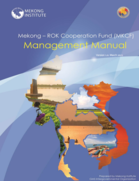MKCF PROJECT APPLICATION

1. ELIGIBILITY
Government agencies/Autonomous Organization from Cambodia, Lao PDR, Myanmar, Viet Nam, Thailand (CLMVT) and organizations from the RoK. Non-governmental organizations, academic institutions, and training institutes from CLMVT and the RoK.
International Organizations, including UN Agencies, and other International Non-Governmental Organizations having operating offices in the Mekong countries and RoK.
Experience in implementing development projects for at least 5 years.
Assistance to individuals will not be provided.
NB – Projects proposals of entirely of research nature or academic research are not encouraged under this fund.
2. PROJECT BUDGET
The contribution of the Fund per project proposal is minimum of 300,000 USD and maximum of 1,000,000 USD.
The fund encourages projects promoting 3-way (triangular) or 4-way (quadripartite) collaboration with other donors, including but not limited to the Mekong River Commission (MRC), Japan, United States (US), Australia, New Zealand, Germany, Canada etc. Extra budgetary funds should be leveraged, when needed, to facilitate such projects.
The fund provides grants for joint activities with a regional or international entity, formalized through a cooperation agreement and is considered as regional. Activities which are not eligible for funding include construction of buildings and payment of rent or utilities.
The time frame of the project should be 2-3 years.
3. APPLICATION STAGE
3.1 EOIS
The announcement of the EOI submission will be made on the websites of the Governments of the Mekong countries, Mekong Institute (MI) and through network of MI partners in the Mekong countries.
Proponents shall need to submit an EOI to the Ministry of Foreign Affairs (MOFA) of the respective countries. International Organizations, including UN Agencies, and other International Non-Governmental Organizations having operating offices in the Mekong countries and RoK based organizations should submit the EoI to RoK MOFA. The EOI should be submitted to the following focal points in the Mekong countries and RoK within the stipulated date.
The EOIs short listed for full proposals do not necessarily guarantee award of final selection of the project.
3.2 FULL PROJECT PROPOSAL
4. PROJECT SELECTION PROCESS
- The announcement of Expression of Interest (EOI) submission from the 5 Mekong countries and the RoK
- The Ministry of Foreign Affairs (MOFA) of the 5 Mekong Countries and ROK collect the EOIs and forward them to MI.
- MI reviews the EOIs, makes a shortlist and submits them to the MOFA-RoK.
- MOFA RoK reviews the EOIs and shortlists the EOIs for full proposal
- MI notifies the shortlisted EOIs and Mekong SOM leader and RoK
- The shortlisted EOIs prepare the full proposal, MI conducts due diligence / assessment and provide advisory services
- MI conducts final review of the proposals and submits to RoK requests for approval

